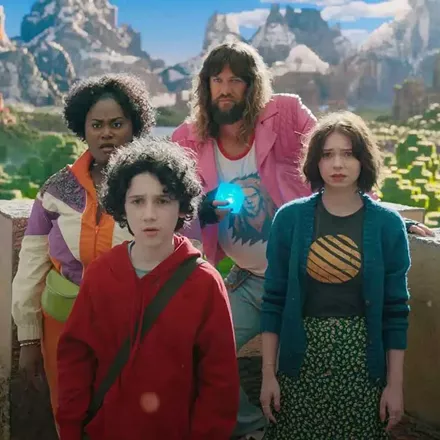Resolved: Meryl Streep can become anyone. Do I have any takers for the “con” position? Thought not.
Over the course of her 35-year film career, Meryl Streep has become an actor so predictably astonishing in her versatility that her name has practically become a verb—a way of describing a performer disappearing into a role, whether physically, through change of voice or some combination thereof. So when you read that Meryl Streep has taken on the role of Margaret Thatcher for the film biography The Iron Lady, there’s almost an “of course” reaction. Who else could embody such a polarizing, iconic woman without descending into caricature? Who else could Streep it as thoroughly as Streep?
The opportunity to see America’s answer to Shakespearean acting royalty play this quintessentially British figure is the main reason for checking out The Iron Lady—and, as it turns out, it’s really the only reason. As conceived by director Phyllida Lloyd (Mamma Mia!) and screenwriter Abi Morgan, it’s a film that plays at tweaking biopic conventions while ultimately offering too little besides the pleasures of watching a master at work.
The film opens in 2009, with a retired Thatcher and her husband, Denis (Jim Broadbent), breakfasting in a London apartment. But we soon learn that Denis has been dead for several years, and that Thatcher is living under supervised care, likely in the early stages of dementia. She soon finds her memory spinning back to her youth in World War II-era London, influenced by her father’s views on self-reliance. The narrative continues to shift back and forth in time, covering Thatcher’s marriage, her initial election to Parliament and the rise to power that led to her controversial 11-year tenure as prime minister.
The setup offers the promise that The Iron Lady might ditch the relentlessly chronological “this happened, then this happened, then this happened” structure that mires so many cinematic life stories in a morass of Wikipedia-entry detail. Indeed, the early sequences—in which the contemporary Margaret finds herself slipping back and forth in time, between conversations with her daughter Carol (Olivia Colman) and memories of years past—are by far the film’s most compelling. Lloyd provides an almost impressionistic vibe to the scenes of the young Thatcher (Alexandra Roach) first coming to Parliament in 1959 in a blur of guilty departure from her children, her shoes and dress isolating her femininity in a sea of male MPs.
And then there’s the slump-in-the-chair moment—right around the time when Denis utters the latest variation on the “you care more about your career than you do about your family” line endemic to so many tedious biopics—when it all turns resolutely conventional. Even as the time line continues to shift back and forth between 2009 and the past, Lloyd and Morgan focus on the most obvious and least interesting elements of each era: Thatcher’s ongoing ghost chats with Denis, whose presence feels increasingly like a structural device rather than exploration of their relationship, and the various crucial bullet-points of Thatcher’s career. The hints that The Iron Lady might ultimately focus on the political equivalent of a retired athlete pondering her post-professional purpose drift, disappointingly, into the background.
It’s most disappointing because Streep’s performance is at its most compelling when she’s conveying the ferocity of Thatcher’s convictions—whether at a time when she has the power to do something about them, or when she no longer does. A terrific scene in a doctor’s office finds the elderly Thatcher fighting off her physician’s condescending manner in a way that captures her philosophy; in a later argument with her ministers over tax policy, she spits out the word “concessions” as though it were a vulgarity. More than any transformation of hairstyle, dental prosthetics or vocal intonations, Streep captures the essence of a woman who would argue, “Our policies may be unpopular, but they are the right policies.” It’s nothing so mundane as an attempt to “humanize” a much-reviled politician; it’s simply a fully realized character.
But The Iron Lady waffles too much over what to do with that character, and spends too much time on the seemingly obligatory montages of rioting laborers, soldiers in the Falklands and other events of the time. Streep’s presence guarantees you won’t doubt for a moment that you’ve seen the story of Margaret Thatcher; the rest of the film can’t decide what that story is.
THE IRON LADY
Meryl Streep, Jim Broadbent, Richard E. Grant
Rated%uFFFD PG-13
Speaking of ,
-
Walk of Shame, The Lego Movie
New DVD/VOD Tuesday, June 17
- Jun 16, 2014
-
Drinking-Class Zero
Following a night of drinking, Wendy Simpson, 25, walked to a McDonald’s restaurant in West Yorkshire, England, where she was told that the counter was closed and only the drive-through was open but that she couldn’t be served
- Jun 16, 2014
-
How to Train Your Dragon 2
Dragon 2 shows DreamWorks is still willing to be daring
- Jun 13, 2014
- More »
More by Scott Renshaw
-
Comedian Steve Hofstetter interview
Veteran standup talks about getting started, dealing with hecklers, and learning a valuable lesson in SLC
- Apr 11, 2025
-
Film Reviews: New Releases for April 11
The Amateur, Drop, The Ballad of Wallis Island, Warfare, King of Kings, Sacramento
- Apr 10, 2025
-
Movie reviews: THE BALLAD OF WALLIS ISLAND, WARFARE, THE KING OF KINGS
Wars of words, weapons and ideas drive three new theatrical releases
- Apr 9, 2025
- More »
Latest in Film Reviews
Readers also liked…
-
Sundance 2025 wrap-up plus February special screenings
Uncertainty about the future location shifts focus away from the movies
- Feb 5, 2025










